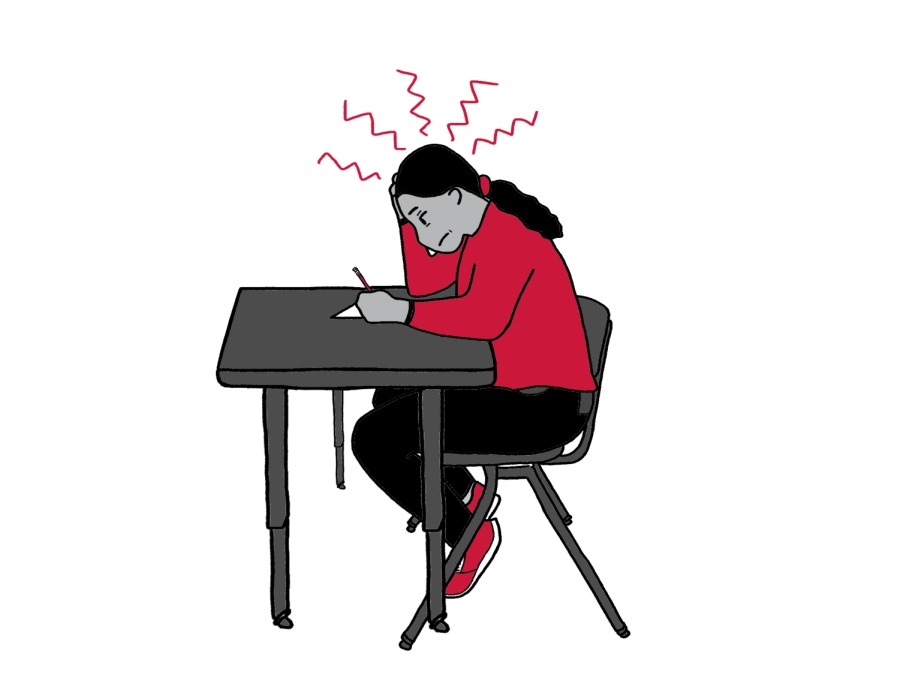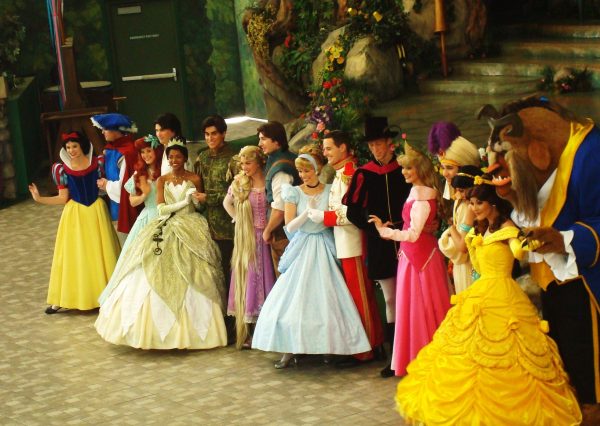Senior contemplates academic experience, competitive environment
“I’m going to hand back the tests now,” says my teacher. My interest is piqued, but I try to pretend that my emotions aren’t already spiraling out of control. That my heart isn’t pounding through my chest and my breaths aren’t shallow. That a single stroke of a red pen won’t define how I feel about myself for the rest of the day.
It’s silly that this simple number throws my mind into crisis mode. And yet, this is a common experience for me and so many other students at Westlake. We all see people panic-studying minutes before an exam, feel the air of apprehension when the teacher hands out the tests and hear groans of dread when grades are released.
I’ve been a straight “A” student for most of my life; the lowest test grade I’ve ever received was on my driver’s test. But behind every test grade is hours of work.
There is nothing unhealthy about caring about your grades and putting in effort at school. Beyond the scope of college applications, it also teaches important skills about preparation and planning. That being said, there is such a thing as going too far, and that’s where many Westlake students find themselves. I haven’t had an entirely positive experience with grades, and I’m sure many others can relate. The fact is, I base most of my self-esteem off my grades, and despite the benefits for my academic performance, that doesn’t always work out well. I recognize my privilege when it comes to dealing with this, but regardless, I hope my words can resonate with anyone else with a similar experience.
Last year, the notoriously difficult junior year, was exacerbated by the difficulties of online school, and it took even more effort to meet my standards. I spent hours refusing to take a break to eat, shower or sleep — all in the name of productivity. Knowing my rank was almost positive reinforcement for my questionable behavior towards school, and watching that number gradually decrease messed with my head even more. Don’t get me wrong, I’m very grateful for the many benefits my rank and grades bring me, but I would be remiss to ignore the way they affected my mental state.
You may call my behavior towards school ridiculous. It’s just high school, right? Nobody will care about it in a few years. And I admit it, the notion that everything will fall apart because I’m not perfect is indeed ridiculous. But it stems from this pressure that eats away at me day and night, deepening my stress while studying and tainting my hours of relaxation.
Starting in middle school, there has been a voice at the back of my mind telling me, “You need to be successful.” I’m not sure why it first spoke up. It’s a relentless itch in my head, praising me while I’m working, screaming at me when I’m not, keeping me awake at night with racing thoughts. “You need to study more, five hours isn’t enough.” “You’re only staying up until midnight; you’re not dedicated enough.” “If you take a break, it’ll be your fault when you fail.” Nothing I did ever seemed to satisfy it, to make it quiet down for once, so I just listened dutifully. Listened while it instructed me to stay up late and go over those flashcards one more time. Listened while it chastised me when someone did better than me. Listened while it berated me for not getting a perfect score. No matter how many times it made me cry, no matter how many times I wanted to stay asleep to keep it at bay, no matter how many times it crippled my self-esteem, I listened because it was helping me achieve my goals.
After nearly four years at Westlake High School, the voice has only grown louder.
Much of academic life at Westlake is “playing the game” to get the grades we want. We’ve all accepted it. We all do it. But have we ever stopped to think about what “the game” entails? Competition based on more hours of studying and less hours of sleep. Encouragement of working at the expense of physical and mental health. The norm of taking on too much. Belittling of others for a poor grade. It’s counterproductive, toxic and exhausting.
Don’t believe me? Washington State University professor Dr. Elizabeth A. Canning and Indiana University professors Dr. Jennifer LaCosse, Dr. Kathryn M. Kroeper and Dr. Mary C. Murphy conducted a longitudinal study in 2019 that examined the effects of classroom competition on the psychological experiences of first-generation college students in STEM courses. While much of this research focuses on imposter feelings — the experience of feeling like a fraud — in first-generation college students, in general, they found that classroom competition has negative consequences for students’ “confidence, motivation, well-being and learning.” These environments are associated with “higher levels of anxiety and stress and often lead students to doubt their competence.” The reality is that this kind of competitive academic environment does more harm than good.
It’s true that I’ve seen many benefits from my grades, such as a college acceptance. However, I also recognize that it took a lot more than my grades to achieve this — colleges look at your well-roundedness, your activities, your essays. Would I still have been accepted had I used that hour to sleep instead of reviewing those flashcards one more time? If I had spent Saturday evening with friends instead of working alone in my room? I’ll never know the answer, but what I do know is that I certainly don’t regret any of those things. I’m proud of my hard work, and it’s incredibly validating to have been rewarded for that work. What I do regret is not pushing myself beyond good grades. I regret not trying out more activities. I regret not seeing friends more often. I regret compromising my mental and physical health for the sake of something that’s caused me so much pain over the years.
I don’t blame students for playing the game, for AP stacking and doing what they can to raise their GPA. I do the same thing. It’s OK if you’re like me, and it’s OK if you’re not like me. This environment affects everyone differently. It’s just a matter of finding a balance.
Take it from me: it’s easier said than done.






